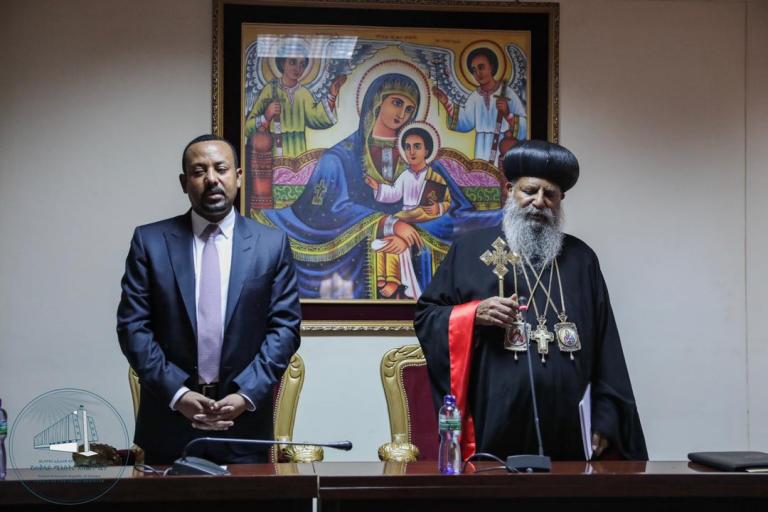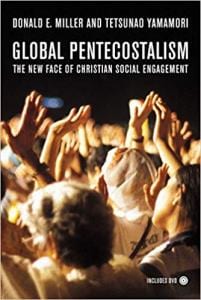In his new book, Who Is an Evangelical?, Thomas Kidd acknowledges that “white English speakers” are just one evangelical cohort among many around the world. Even in this country, Christian immigrants from the Global South have “transformed American evangelical and Pentecostal churches.” In fact, such ministries “are perhaps more representative of evangelicals than the political labors of the Republican evangelical insiders, in spite of the disproportionate news coverage given to the latter.”
So it was striking to see this headline last week, at the website of America’s leading evangelical publication, Christianity Today:
Ethiopia’s Evangelical Prime Minister Wins Nobel Peace Prize
Recognized primarily for resolving decades-long conflict with Eritrea, the 43-year old Abiy Ahmed has also tried to mend interreligious rifts as a Protestant in a historically Orthodox nation with a substantial Muslim population. CT’s Kate Shellnut noted that Ahmed is the child of a Muslim father and Orthodox mother, but is himself a “Pente” — one of the 4.5 million members claimed by the Pentecostal Full Gospel Believers’ Church (FGBC).
https://twitter.com/ThomasSKidd/status/1183497047221178369
But “Pente” can serve as a blanket term for all Ethiopian Protestants, including some of the largest communities of Lutherans and Mennonites in the world. Is a Pentecostal like Ahmed an evangelical?
Kidd argues that Pentecostals generally fit his definition of evangelicals as “born-again Protestants who cherish the Bible as the Word of God and who emphasize a personal relationship with Jesus Christ through the Holy Spirit.” (I suspect he would have a harder time with Ahmed’s predecessor, a Oneness Pentecostal whose church denies the Trinity.) While he acknowledges significant differences between Pentecostals and those evangelicals who believe that certain gifts of the Holy Spirit ceased after the Early Church, Kidd thinks that evangelicals and Pentecostals are at least “cousins,” even if they “don’t always act like brothers and sisters.”
But over the weekend, Pentecostal scholar Dale Coulter tweeted that it would “muddy the waters” to identify Abiy Ahmed with evangelicalism.
3/ They have almost no institutional connections to American evangelicalism. American Pentecostalism, yes, but not American evangelicalism. For example, almost all Pentecostals in Ethiopian trace their beginnings to Swedish & Norwegian Pentecostal missions.
— Dale M. Coulter (@DaleMCoulter) October 12, 2019
I’m *not any kind of expert on this topic, but Coulter’s tweets did make me curious: just what is the history of Pentecostalism in Ethiopia? What connection does it have to evangelicalism?

Pentecostalism in Ethiopia is a relatively recent phenomenon, dating from the arrival of Finnish and Swedish missionaries in the 1950s. Ahmed’s denomination was founded in 1966-1967, then largely driven underground by both the Orthodox emperor Haile Selassie and the Communist military regime that succeeded him. (British scholar Dena Freeman notes that the first Ethiopian Pentecostals tended to be university students who found in Pentecostalism what their classmates found in Marxism: “radical new ways to conceive of individuals and society, meaning and justice.”) But the end of the Derg junta in 1987 and the passage of a religious freedom law in 1991 led to full recognition of churches like the FBGC. By some estimates, Pentecostals now make up over 20% of the Ethiopian population. (Though again, not all “Pentes” are Pentecostals, but many Lutherans, Baptists, and other Protestants are charismatics.)
While the movement started in urban centers like Addis Ababa, Pentecostalism “remains foremost a rural phenomenon” according to Jörg Haustein and Emanuele Fantini. But Pentecostalism beyond the cities has a somewhat different origin story. Freeman studies the Gamo Highlands of the southwest, where Protestantism began to make converts in the 1930s thanks to the efforts of the Sudan Inland Mission (SIM) and local evangelists. But in the 1970s, those Protestants encountered the Full Gospel church while trading in local towns and were impressed by the Pentecostal practice of exorcising spirits in the name of Jesus, to the consternation of SIM’s evangelical missionaries.
Of course, the debate over spiritual gifts is not the only historic tension between evangelicals and Pentecostals. Kidd excludes from his definition of evangelicalism all “hard-edged” adherents of the Prosperity Gospel, “a popular and controversial outgrowth of Pentecostalism” teaching that “the proper exercise of faith will inexorably lead to health, wealth, and ‘victorious living.’” But in much of the Global South — including Ethiopia — Pentecostalism is appealing precisely because it seems to promise “health and wealth” to people who have often known neither.
Last November an Economist profile probed the prominence of Pentecostal politicians in a country with one of the fastest-growing economies in the world. While it didn’t attribute prosperity views to Ahmed, it did report their prevalence among Pente Christians like the preacher quoted to open the story: “The reason why we are poor is inside us. It is not the fault of God.” The Economist article also noted Freeman’s research. She concluded that the Pentecostal emphasis on “the direct connection between the individual and God” had encouraged economic self-sufficiency among rural entrepreneurs who found success in new ventures like apple farming. Among them, she found, “spiritual transformation is considered just the first step in a broader process widely known as ‘transformational development’: through which believers are encouraged to build new relations, new communities and new economies.”
 But Pentecostalism speaks to concerns of health, not just wealth. Ahmed’s predecessor as Nobel Peace Prize winner was another African Pentecostal: gynecologist Denis Mukwege, who healed thousands of women raped during Congo’s brutal civil war. From Ethiopia, Donald Miller and Tetsunao Yamamori tell the story of Florence Muindi, who was inspired to go to medical school when she received divine visions during the famine of 1984. In partnership with a Pentecostal congregation in Addis Ababa, she began to train “health evangelists” to work with poor families and local officials to improve sanitation and prevent diseases afflicting children.
But Pentecostalism speaks to concerns of health, not just wealth. Ahmed’s predecessor as Nobel Peace Prize winner was another African Pentecostal: gynecologist Denis Mukwege, who healed thousands of women raped during Congo’s brutal civil war. From Ethiopia, Donald Miller and Tetsunao Yamamori tell the story of Florence Muindi, who was inspired to go to medical school when she received divine visions during the famine of 1984. In partnership with a Pentecostal congregation in Addis Ababa, she began to train “health evangelists” to work with poor families and local officials to improve sanitation and prevent diseases afflicting children.
For Miller and Yamamori, Muindi exemplifies how a new wave of global Pentecostals don’t emphasize “personal salvation to the exclusion of any attempt to transform social reality.” Instead, they affirm that “Christians are called to be good neighbors, addressing the social needs of people in their community” — precisely because “the Holy Spirit speaks directly to them about their social involvements in the community.”
And if that’s true — or if a similar kind of Spirit-inspired neighbor-love has motivated Ahmed’s acts of reform and reconciliation — then I’m not sure how much I care if Ethiopian Pentecostals are evangelicals. I’d just be happy to see American evangelicals act more like such Pentecostals.
*A note about sources, since I’m clearly out of my element here:
Ethiopian Pentecostalism is new enough that it seems to receives sparse coverage in some of the standard histories of that branch of Christianity in Africa. For example, in his 2008 introduction to the subject, the late Ogbu Kalu makes much of the early 20th century “Ethiopian” churches that took inspiration from that country’s continuing independence. Their belief “that Africa could be redeemed through Christianity” became one of the “recurring themes that would engage and energize African Pentecostalism” to this day. But as far as I can tell, he says nothing about the historical development of Pentecostalism within present-day Ethiopia.
In 2013 the journal PentecoStudies published a special issue devoted to Pentecostalism in Ethiopia, featuring papers by European scholars like Haustein, Fantini, and Freeman, but also Tibebe Eshete, whose book on The Evangelical Movement in Ethiopia was published by Baylor Press a year after Kalu’s. Those articles are my main source for this post.













